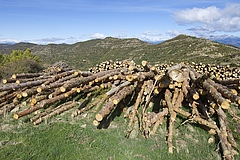Cloud cover reduced by large-scale deforestation

Large-scale deforestation has a greater warming effect on the climate than previously thought. (Picture: Colourbox)
Serious impact on climate, say researchers
Based on a media release of Leipzig University
Researchers from iDiv, Leipzig University and Sun Yat-sen University in China have found that large-scale deforestation has a greater warming effect on the climate than previously thought. Their analysis of computer simulations and observations showed a decrease in cloud cover in these deforested areas. Deforestation has a warming effect by releasing carbon dioxide, but at the same time forests are darker than cleared areas. This effect causes cooling because less sunlight is absorbed. The new study shows that the reduction in cloud cover almost halves this cooling effect. These new findings have just been published in the journal Nature Communications.
“We found decreases in global low-level clouds and tropical high-level clouds from deforestation,” says lead author Dr Hao Luo from the Institute for Meteorology at Leipzig University, who co-authored the paper with his institute colleague Professor Johannes Quaas and Professor Yong Han from Sun Yat-sen University in China. Johannes Quaas adds: “Low-level clouds have a cooling effect on the climate because they reflect a lot of sunlight.”
The researchers analysed idealised deforestation simulations using climate models and reanalyses, and on this basis provided insights into local decreases in global low-level clouds and tropical high-level clouds as a result of large-scale deforestation. “The decreased cloud cover can be explained by alterations in surface turbulent heat flux, which diminishes uplift and moisture to varying extents,” says Professor Quaas, who is also an iDiv Member.
According to the researchers, the impact of the different meteorological processes in forests and deforested areas on clouds and the associated radiative balance has not yet been sufficiently studied. For example, researchers in meteorology and biodiversity science are currently investigating the role of forest biodiversity and its impact on clouds.
Susann Sika
Original publication
(Reseachers with iDiv affiliation bolded)
Luo, H., Quaas, J. & Han, Y. (2024). Decreased cloud cover partially offsets the cooling effects of surface albedo change due to deforestation”, Nature Communications, DOI: 10.1038/s41467-024-51783-y
Contact:
Prof Dr Johannes Quaas
Institute for Meteorology / Theoretical Meteorology
Leipzig University
Phone: +49 341 9732931
Email: johannes.quaas@uni-leipzig.de
Kati Kietzmann
Media and Communications
German Centre for Integrative Biodiversity Research (iDiv) Halle-Jena-Leipzig
Phone: +49 341 9739222
Email: kati.kietzmann@idiv.de
